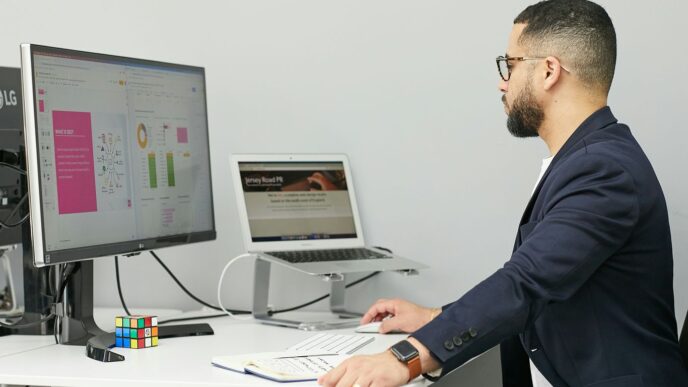Success isn’t just about luck or talent; it’s about certain traits that successful people share. If you look closely, you’ll find that these traits help them navigate challenges and achieve their goals. In this article, we’re going to explore 10 qualities of a successful person that can guide you on your own path to success. Whether you’re aiming for personal growth or professional achievements, understanding these traits can make a big difference.
Key Takeaways
- Successful people have a clear vision of their goals and where they want to go.
- Persistence and discipline are key; they keep pushing through challenges and stay focused on their tasks.
- A commitment to learning and self-improvement helps them adapt and grow in their fields.
1. Vision
Okay, so vision. It’s not just about seeing what’s in front of you, right? It’s about picturing something more. It’s like having this internal compass that guides you, even when things get super confusing. I think it’s about seeing the potential in things, even when others don’t. It’s about having a clear picture of where you want to be, and then figuring out how to get there. It’s not always easy, but without that vision, you’re just wandering around aimlessly.
Think about it this way:
- Setting Goals: It all starts with knowing what you want to achieve. Without goals, you’re just drifting.
- Strategic Planning: Once you have that vision, you need a plan. How are you going to make it happen? What steps do you need to take? It’s like drawing a map to your destination.
- Inspiring Others: A strong vision can get other people on board. If you can clearly articulate your vision, you can motivate others to help you achieve it. It’s about painting a picture that people want to be a part of.
It’s also about being able to adapt. The world changes, and sometimes your vision needs to evolve too. It’s not about being stubborn, it’s about being flexible and adjusting your course when needed. Having a clear vision is super important.
2. Drive
Okay, so vision is cool and all, but what good is seeing the top of the mountain if you’re not willing to actually climb it? That’s where drive comes in. It’s the internal engine that keeps you moving, even when things get tough. It’s more than just wanting something; it’s about pushing yourself to get it. I think of it as the difference between thinking about going to the gym and actually dragging yourself there at 6 AM.
Drive is what separates the dreamers from the doers. It’s not always pretty, and it definitely isn’t always easy, but it’s absolutely essential for success. It’s that fire in your belly that says, "I’m not giving up," even when everything seems to be going wrong. It’s about having the grit to keep going, the determination to overcome obstacles, and the sheer willpower to make things happen. It’s the fuel that powers your journey, turning your vision into reality. You need browser settings to access the content.
Here are some things that can help you cultivate more drive:
- Set clear goals: Knowing exactly what you want to achieve makes it easier to stay motivated. Break down big goals into smaller, manageable steps. This way, you can see progress and feel a sense of accomplishment along the way.
- Find your "why": Connect with the deeper reason behind your goals. Why is this important to you? What impact will it have? When you’re connected to your "why", it’s easier to push through challenges.
- Celebrate small wins: Acknowledge and celebrate your progress, no matter how small. This helps build momentum and keeps you motivated. Treat yourself to something you enjoy when you reach a milestone. It’s important to gain practical skills through experience.
- Surround yourself with motivated people: The people you spend time with can have a big impact on your own drive. Surround yourself with people who are ambitious, supportive, and positive. Their energy will rub off on you.
- Embrace challenges: View challenges as opportunities for growth, not as roadblocks. When you face a setback, ask yourself what you can learn from it and how you can use it to improve. This mindset will help you stay resilient and keep moving forward.
3. Self-Reliance
Okay, so self-reliance. It’s not just about doing everything alone; it’s more about knowing you can handle things. It’s a mindset. Like, I remember when my car broke down in the middle of nowhere. Instead of panicking, I actually tried to fix it myself (YouTube tutorials are a lifesaver, sometimes!). Didn’t work perfectly, but I felt pretty good about giving it a shot. That’s self-reliance in action.
Here’s what I think it boils down to:
- Taking Responsibility: You own your actions, good or bad. No blaming others. If you mess up, you admit it and figure out how to fix it. Like when I accidentally deleted all my vacation photos? Yeah, I spent hours trying to recover them instead of yelling at my phone. It’s about accountability.
- Making Decisions: You’re not afraid to make tough calls. You weigh the options and choose a path, even if it’s not the popular one. It’s about trusting your judgment. I had to decide whether to quit my job and pursue my passion for pottery. Scary, but I made the call.
- Problem-Solving Skills: You don’t freak out when things go wrong; you try to find solutions. You look at the situation logically and figure out a plan. Remember that time I had to enhance engagement on my friend’s social media? I researched strategies and experimented until we saw results. It’s about being resourceful.
- Knowing Your Limits: This is key. Self-reliance isn’t about being a superhero. It’s about knowing when to ask for help. If you’re truly stuck, swallow your pride and reach out. I’m terrible at electrical work, so I always call an electrician. It’s about being smart, not stubborn.
Basically, self-reliance is about having the confidence to navigate life’s challenges, knowing you have the inner resources to figure things out. It’s a pretty empowering feeling, to be honest.
4. Passion
Okay, so passion. It’s not just some fluffy feeling, right? It’s the fuel that keeps you going when things get tough. I mean, seriously, who wants to drag themselves through something they hate every single day? Passion is what separates the people who just show up from the ones who actually make something happen. It’s that simple. If you want to reach your goals, you need to care about what you’re doing.
Think about it this way:
- It gives you energy: When you’re passionate, you’re excited. That excitement translates into energy. You’re willing to put in the extra hours, to push through the setbacks, because you genuinely care about the outcome. It’s not work when you love it, or so they say.
- It makes you more creative: Passion sparks creativity. When you’re invested in something, your mind is constantly searching for new and better ways to do things. You’re more likely to think outside the box and come up with innovative solutions. It’s like your brain is on overdrive, constantly churning out ideas.
- It helps you persevere: Let’s be real, success isn’t a straight line. There are going to be bumps in the road, obstacles to overcome. Passion is what keeps you going when you feel like giving up. It reminds you why you started in the first place and gives you the strength to keep pushing forward. It’s the ultimate motivator.
Passion can’t be faked. You have to truly feel that what you’re doing is necessary and/or deeply meaningful. It’s about finding something that resonates with you on a personal level, something that gets you fired up and excited to jump out of bed in the morning. And when you find that thing? Hold on tight, because it’s going to take you places.
5. Optimism
Okay, so optimism. It’s not about being all sunshine and rainbows all the time. It’s more about having a fundamental belief that things can get better, even when they’re currently a dumpster fire. I think it’s about seeing possibilities instead of just problems. It’s a mindset, and honestly, it’s one I struggle with sometimes, but I’m working on it.
Why is it important? Well, for starters:
- It fuels motivation: If you think things will improve, you’re way more likely to actually do something to make them better. Otherwise, what’s the point, right?
- It builds resilience: When you hit a wall (and you will), optimism helps you bounce back. You see the setback as temporary, not a sign that you’re doomed to fail forever. SAP solutions can help with this.
- It attracts opportunities: People are drawn to positive energy. If you’re optimistic, others are more likely to want to work with you, help you out, and be around you in general.
I’m not saying ignore reality or pretend everything’s perfect. But choosing to focus on the potential for good, even in tough situations, can make a huge difference. It’s like, you can either see the glass as half empty or half full. And honestly, I’d rather see it as half full… or at least refillable.
6. Persistence
Okay, so you’ve got a vision, you’re driven, and you’re even feeling optimistic. Great! But what happens when things get tough? That’s where persistence comes in. It’s not enough to start strong; you’ve got to be able to keep going, even when you feel like giving up. I think that job searching requires a lot of persistence.
Think about it: everyone faces setbacks. It’s how you respond to those setbacks that really matters. Do you throw in the towel, or do you dust yourself off and try again? Successful people choose the latter, time and time again. It’s like that old saying: "If at first you don’t succeed, try, try again."
Here’s what persistence might look like in practice:
- Reframing Failure: Instead of seeing failure as a sign to quit, view it as a learning opportunity. What can you take away from the experience that will help you next time?
- Breaking Down Goals: Sometimes, the sheer size of a goal can feel overwhelming. Break it down into smaller, more manageable steps. This makes the overall task seem less daunting and provides a sense of progress along the way.
- Seeking Support: Don’t be afraid to ask for help. Talk to mentors, friends, or family members who can offer encouragement and advice. Sometimes, just knowing that someone believes in you can make all the difference.
- Maintaining a Long-Term Perspective: Success rarely happens overnight. Be patient and focus on the long-term vision, even when you encounter short-term obstacles. Remember why you started in the first place, and let that fuel your determination.
Persistence isn’t about being stubborn or refusing to adapt. It’s about having the grit and determination to keep moving forward, even when the path gets rough. It’s about believing in yourself and your ability to achieve your goals, no matter what challenges you face. It’s about maintaining focus and not giving up easily.
7. Discipline
Okay, so discipline. It’s not the most exciting word, right? But honestly, it’s a game-changer. It’s about doing what you need to do, even when you really don’t feel like it. We all have those days where Netflix is calling our name louder than our to-do list. But successful people? They’ve figured out how to tell Netflix, "Not today!"
Think of it like this:
- Saying "no" to distractions: It’s so easy to get sidetracked. A notification pops up, a friend texts, suddenly you’re down a rabbit hole of cat videos. Discipline is about recognizing those distractions and actively choosing to ignore them. It’s about creating an environment where you can focus. For example, when planning executive travel, you need to focus on the task at hand.
- Building habits: Discipline isn’t about being perfect all the time. It’s about building good habits that eventually become second nature. Start small. Maybe it’s waking up 15 minutes earlier each day, or spending 30 minutes working on a project before checking social media. Over time, these small habits add up to big results.
- Pushing through discomfort: Let’s be real, sometimes the things we need to do are just plain uncomfortable. Maybe it’s making a difficult phone call, or working on a project that you find challenging. Discipline is about pushing through that discomfort and doing it anyway. It’s about knowing that the reward is worth the effort.
Discipline isn’t about being a robot. It’s about having the self-control to make choices that align with your goals, even when it’s hard. And trust me, it gets easier with practice.
8. Desire to Improve

Okay, so nobody’s perfect, right? Even those super successful people you see probably have things they’re not awesome at. The key is, they know it, and they’re actively trying to get better. It’s not about beating yourself up, but more about recognizing areas where you can grow. I think that’s a big deal. A solid digital marketing strategy can help you see where you need to improve.
Think about it like this:
- Identify Weak Spots: What are you not good at? Be honest! Maybe it’s public speaking, maybe it’s managing your time, maybe it’s coding. Whatever it is, acknowledging it is the first step.
- Seek Feedback: Ask people you trust for honest feedback. This can be brutal, but it’s super helpful. They might see things you don’t.
- Embrace Challenges: Don’t shy away from things you’re bad at. Instead, see them as opportunities to learn and grow. Sign up for that class, take on that project, push yourself outside your comfort zone.
- Celebrate Small Wins: Improvement isn’t always a straight line. There will be ups and downs. Celebrate the small victories along the way to stay motivated. It’s a marathon, not a sprint!
It’s all about having that mindset of continuous growth. Always be learning, always be pushing yourself, and always be striving to be a better version of yourself than you were yesterday. That’s what separates the good from the great, in my opinion.
9. Commitment to Learning
Okay, so you’ve got the vision, the drive, and maybe even a healthy dose of self-confidence. But what happens when you hit a wall? That’s where a real commitment to learning comes in. It’s not just about getting a degree and calling it a day. It’s about constantly seeking new information, new skills, and new perspectives.
I think it’s about staying curious. The world changes so fast, and if you’re not learning, you’re falling behind. It’s as simple as that. I’ve seen so many people get stuck in their ways, refusing to adapt, and then they wonder why they’re not progressing. Don’t be that person!
Here’s how you can cultivate a commitment to learning:
- Read widely: Don’t just stick to your industry blogs. Read books, articles, and even fiction. You never know where you’ll find inspiration or a new idea. I’ve found that reading about history can give you a new perspective on current events.
- Take courses: Online courses are everywhere these days. Find something that interests you and dive in. It doesn’t have to be directly related to your job. Maybe you want to learn a new language or how to play the guitar. The point is to keep your mind active and engaged. Consider a graduate certificate to boost your knowledge.
- Find a mentor: A mentor can provide guidance, support, and new insights. Look for someone who has achieved what you want to achieve and ask them to share their wisdom. I’ve had several mentors over the years, and they’ve all helped me in different ways.
- Embrace failure: Failure is a learning opportunity. Don’t be afraid to make mistakes. The important thing is to learn from them and move on. I’ve failed more times than I can count, but each failure has made me stronger and more resilient.
- Attend workshops and seminars: These events are a great way to learn new skills and network with other professionals. I always try to attend at least one conference a year. It’s a great way to stay up-to-date on the latest trends and technologies. You can improve your communication skills by attending these events.
It’s a lifelong journey, not a destination. Embrace the challenge, and you’ll be amazed at what you can achieve.
10. Self-Confidence

Okay, so self-confidence. It’s not about being the loudest person in the room or pretending you know everything. It’s more about trusting yourself, even when things get tough. I think it’s about having a quiet belief that you can figure things out, even if you don’t have all the answers right now. It’s like, you know you’re not perfect, but you’re willing to try and learn.
Think about it: if you don’t believe in yourself, who will? It’s hard to convince others to take a chance on you or your ideas if you’re constantly doubting yourself. It’s not about arrogance; it’s about having a solid foundation of self-belief.
Here’s what I’ve noticed about people who have genuine self-confidence:
- They take calculated risks. They don’t just jump into anything blindly, but they’re not afraid to step outside their comfort zone. They assess the situation, weigh the pros and cons, and then make a decision based on what they believe is the best course of action. It’s about embracing your value and moving forward.
- They handle criticism well. Nobody likes being criticized, but people with self-confidence don’t let it crush them. They see it as an opportunity to learn and grow. They listen to what others have to say, consider the feedback, and then decide what to do with it. They don’t take it personally; they see it as a chance to improve.
- They don’t compare themselves to others. This is a big one. It’s so easy to get caught up in comparing yourself to everyone else, especially with social media. But truly confident people know that everyone is on their own journey. They focus on their own goals and progress, and they don’t worry about what others are doing. They understand that personal growth is a marathon, not a sprint.
Self-confidence isn’t something you’re born with; it’s something you build over time. It’s about setting small goals, achieving them, and then building on that success. It’s about learning from your mistakes and not letting them define you. It’s about surrounding yourself with people who support you and believe in you. And most importantly, it’s about being kind to yourself and recognizing your own worth.
Building self-confidence is key to achieving your goals. When you believe in yourself, you can take on challenges and overcome obstacles. If you want to learn more about boosting your self-confidence, visit our website for tips and resources that can help you grow. Don’t wait—start your journey to a more confident you today!
Final Thoughts on Success
So, there you have it. The ten qualities that can really make a difference in your journey to success. It’s not just about having a great idea or being in the right place at the right time. It’s about building these traits into your life. Whether it’s being driven, staying optimistic, or just being willing to learn, these are the things that can set you apart. Remember, success doesn’t happen overnight. It takes time, effort, and a lot of persistence. So, take a moment to reflect on these qualities. Which ones do you already have? Which ones do you need to work on? Start small, and over time, you’ll see how these traits can lead you to where you want to be.














